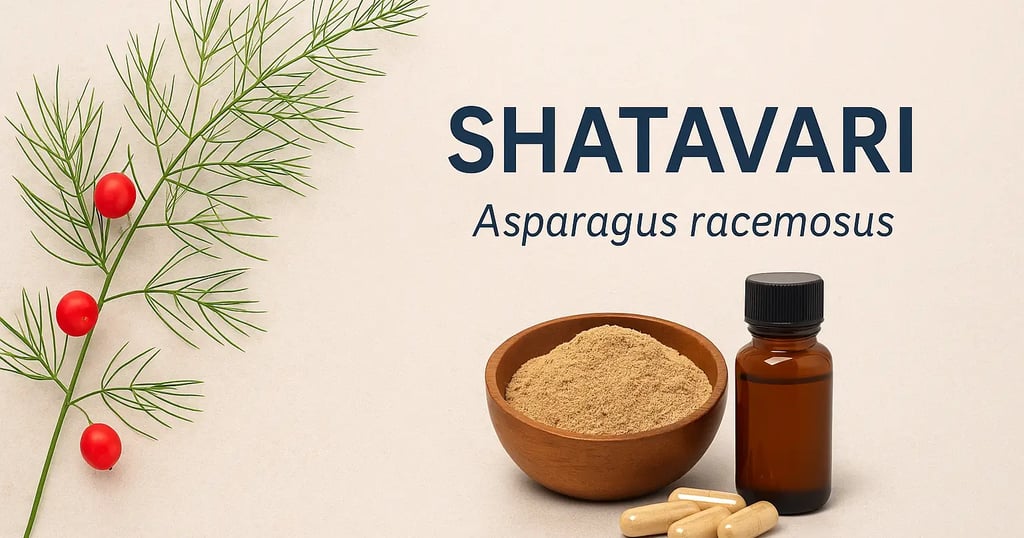Shatavari (Asparagus Racemosus): Health Benefits, Uses, Nutritional Value & Precautions
Discover the powerful health benefits of Shatavari (Asparagus Racemosus), a renowned Ayurvedic herb for women’s health, immunity, stress relief, and hormonal balance. Learn its uses, nutritional profile, dosage, and precautions.


🌿 Introduction to Shatavari (Asparagus Racemosus)
Shatavari, also known by its botanical name Asparagus racemosus, is a prized Ayurvedic herb known for its powerful adaptogenic and health-promoting properties. This perennial climbing plant has long been celebrated in traditional Indian medicine, especially for supporting female reproductive health, balancing hormones, and improving immunity.
The name “Shatavari” literally translates to “woman with a hundred husbands,” reflecting its legendary association with women’s vitality and hormonal balance. Native to India, Shatavari thrives in diverse ecosystems, from tropical forests to open plains. It features slender green leaves, small white-yellowish flowers, and bright red berries, each contributing to its distinctive identity in Ayurvedic medicine.
Today, Shatavari is gaining global recognition as a potent herbal remedy for hormonal imbalance, stress relief, and overall wellness. Its adaptogenic nature helps the body manage stress, while its unique phytonutrient profile supports physical and emotional health—especially in women navigating menopause, pregnancy, or menstrual issues.
🍃 Nutritional Profile and Active Compounds in Shatavari
The nutritional value of Shatavari makes it a standout among Ayurvedic medicinal herbs. Rich in essential vitamins and minerals, Shatavari (Asparagus racemosus) contains:
Vitamins: A, C, and B-complex (B1, B2, B6)
Minerals: Calcium, Magnesium, Potassium, Phosphorus
These nutrients contribute to stronger bones, hormonal health, and immune support.
What makes Shatavari especially powerful is its bioactive compounds:
Saponins: Known for antioxidant and immune-boosting effects
Glycosides: Enhance stress response and hormonal regulation
Alkaloids: Support nervous system and hormone balance
Flavonoids: Offer anti-inflammatory and antimicrobial benefits
These compounds make Shatavari a natural adaptogen, ideal for boosting energy, reducing inflammation, and supporting the body during emotional and physical stress.
💪 Top Health Benefits of Shatavari
1. 🌸 Supports Women’s Reproductive Health
Shatavari is a top-recommended Ayurvedic herb for women, helping balance estrogen levels and ease symptoms of PMS, menopause, and menstrual irregularities. It contains natural phytoestrogens that regulate hormones and support fertility.
2. 🍼 Boosts Lactation in Mothers
As a natural galactagogue, Shatavari enhances breast milk production in nursing mothers, ensuring better nourishment for newborns and postpartum recovery.
3. 🛡️ Strengthens Immunity
Shatavari acts as an immunomodulator, enhancing the body’s defense mechanism against infections and illnesses. Its antioxidant saponins and flavonoids reduce inflammation and protect against oxidative stress.
4. 🧘♀️ Reduces Stress & Improves Mood
The adaptogenic nature of Shatavari powder and extracts helps stabilize cortisol levels, reducing anxiety, fatigue, and emotional imbalance. This makes it a go-to herb for managing chronic stress naturally.
5. 💚 Improves Digestive & Respiratory Health
Traditionally used for treating gastric ulcers and respiratory issues, Shatavari’s soothing effects on the stomach and lungs promote better digestion and breathing.
🧪 How to Use Shatavari & Dosage Guidelines
Shatavari supplements are available in multiple forms:
Shatavari powder (churna)
Shatavari capsules or tablets
Liquid extract or tincture
Shatavari tea
Recommended dosage:
Powder: 1–3 grams per day (mix with warm milk or water)
Tincture: 30–40 drops, 2–3 times daily
Always consult with an Ayurvedic practitioner or healthcare provider for personalized advice.
⚠️ Precautions & Side Effects of Shatavari
While Shatavari (Asparagus racemosus) is generally safe, it's important to consider the following precautions:
May cause bloating, allergic reactions, or hormonal effects in some users
Not recommended for people with hormone-sensitive conditions (e.g., breast cancer, PCOS, etc.)
Pregnant or breastfeeding women should consult a doctor before use
Possible interaction with diuretics or hormone medications
Using Shatavari responsibly ensures its benefits without side effects.
✅ Conclusion: Should You Include Shatavari in Your Wellness Routine?
Shatavari is a versatile Ayurvedic herb backed by centuries of traditional use and growing modern research. With benefits ranging from hormonal balance and immunity to stress reduction and digestion, it's a must-have natural remedy for anyone looking to support their health holistically.
Whether you're seeking herbs for female health, natural stress relief, or immune boosters, Shatavari (Asparagus racemosus) is a trusted, plant-based solution that fits seamlessly into your wellness routine.
